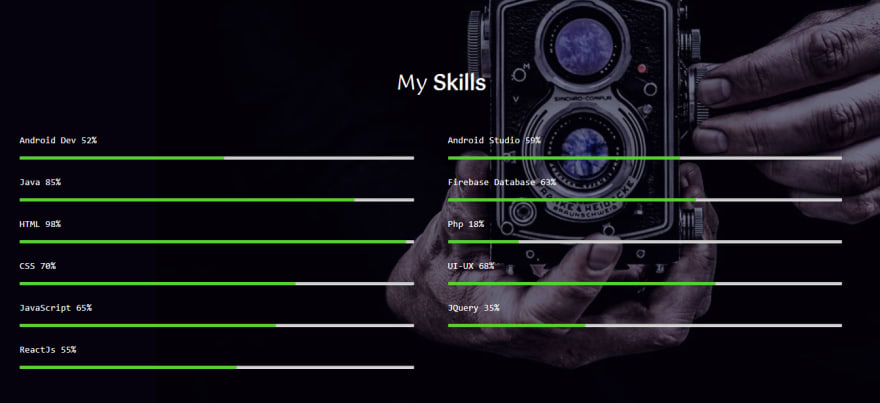This content originally appeared on DEV Community and was authored by Lucius Emmanuel Emmaccen
I have often found people to shy away from the practice of having a professional portfolio. While it might seem negligible in some situations, more often than not, it has proven to be of great importance.
In this article, we are going to observe and answer a few questions:
- What is a portfolio?
- Why do you need one?
- What jobs/industries use portfolios
- What should go into a portfolio
- What should not go into a portfolio
- Should you have a "hard copy" or "online" portfolio
- How do you create one?
What is a portfolio?
A portfolio is a collection of records or documentation that provides proof of accomplishments, experience, skills, attributions and work samples. It can be a website, a binder or a physical book, depending on the line of work or profession.
It might be necessary to note that a Portfolio is quite different from a Resume.
Why do you need one?
Having a portfolio can improve your recognition in a professional or academic setting. It is an opportunity to illustrate your competencies, presents evidence of your skills and abilities, highlights a comprehensive idea of your best work and can be seen as a brochure for the services you are selling. It allows you to show and not just tell.
Portfolios are great for freelancers or independent contractors, business owners or consultants who need to provide work samples to potential clients. The practice of putting together a portfolio:
- Serves as a reminder of your past accomplishments and acquired skills
- Allows you to showcase your creativity and persona that differentiates you from your competition
- A source of motivation, high self-esteem and confidence
- Gives you credibility
- Makes you a more effective interviewee
- Helps potential clients visualize working with you
- Can help apply for jobs, scholarships, grants and negotiating promotions and raises.
- Can pass for work and learning experience
- Helps you to be seen and discovered (e.g. online portfolio)
- Allows you to market the services you provide and build a reputation and following.
- Demonstrates consistency and compels you to learn/do more
There are more reasons to consider, but I am sure you get the idea.
What jobs / industries use portfolios?
Years back, it is common to see more people in the Visual Profession having a portfolio, such as Artists and Creative professionals, photographers, architects, teachers, graphic designers, front-end engineers, painters, etc.
In the world today, every professional can benefit from having one, even those in the fields not directly related to visual. e.g. Backend engineers (could create documentation of their involvement in a project, a short video or utilize GitHub etc.), Radio broadcasters/podcasters, Attorneys, judges and politicians, coaches and athletes etc.
What should go into a portfolio?
Anything that spotlights your accomplishments and abilities should go in your portfolio. It should capture an idea of who you are and the services you provide.
Here are some items I would recommend you incorporate in your portfolio:
- A short and precise summary of who you are.
- Updated resume or CV
- List of skills, tools or technologies you use
- Work experience
- Diplomas (Education), professional certificates and Transcripts (if any)
- Reference letters, awards, testimonials, and LinkedIn recommendations
- Some of your content (if you create content) e.g. Blogs, YouTube videos, Podcasts etc.
- Work samples you have created e.g. Websites, UI/UX designs, project documentation or case studies, video presentations, Artwork (for artists), PowerPoint presentations, Slides etc.
- Lists of accomplishments/awards
- Thank you notes or emails from clients or co-workers (Testimonials) etc.
What should not go into a portfolio?
You might get tempted to want a whole Wikipedia of things on your portfolio, but more often than not, it does not increase positive perception. Being super precise and detailed is very important when structuring your portfolio (which is beyond the scope of this article) as it can considerably improve the way you are seen as a professional.
Here are a couple of things I have found to be less useful in a portfolio
- Having a waterfall of summary in your "About Me" section. A couple of lines of text should pretty much tell the story
- Do not put ratings or percentages on your skills. I am guilty as I did it in the past. We could argue all day about it, but the truth is, own your skill and do not put a dent in it. Having things like: HTML(50%), CSS(90%), Photoshop(45%) etc.
Here's a screenshot taken from my first portfolio website

Please, remove the ratings. Your 50% rating might be the 100% a company is looking for.
- Overly-complicated, overly-designed layout
- Lack of proper structure and personality
- Do not tell personal stories.
- Do not include your house address (Employers will not perceive you as being security conscious, same for your CV). Your email is just fine.
- Only include things relevant to your field of work/study.
- Use only high-fidelity images (but one that will still load fast in the browser)
- Provide a way to get in touch e.g. A mail, link or a contact form.
Your get-in-touch section might look something like this if you decided to go with a form field:
Screenshot is taken from my current portfolio

Should you have a hard copy or online portfolio?
Whether or not you use an online or hard copy portfolio, all depends on your industry and personal preference. Research your industry for what's common and beneficial, then, make a decision.
whichever industry it is, it might still be beneficial to have an online presence.
How do you create one?
For online portfolios, you can build one for yourself if you are a web developer, have someone build one for you, or use a prebuilt template.
Anyone you decide, be sure to research and make good decisions on what design best suits your field.
For hard-copy portfolios, you can use a ring binder or leather-bound padfolio. Be sure to organize/tab them into sections.
Feel free to google “online portfolio websites” or “online portfolio builder”. You can also get design inspiration from hundreds of websites out there if you are building one for yourself.
Please note: It does not have to be 100% a website.
I have seen people use several platforms as their portfolio, e.g.
- Google slides
- Google Drive portfolio
- A PDF hosted online
- A Figma or Adobe Design with a "live link"
Other options you could utilize:
- Your LinkedIn profile
- GitHub profile with projects having detailed ReadMe.md describing project specifications, features and your involvement
- Behance and, many more.
Again, research your industry and find what best suits you.
Pro Tips
- Replace practice projects with professional ones as soon as you start having them, e.g. Remove the calculator web app you coded and replace it with your new blog website (even if it is just presentation/static).
- Update the CV on your portfolio as you update them on your PC or mobile
- Do not waste considerable time trying to make it perfect, it never will. You can always make minor updates later in the future.
- Get your portfolio reviewed by a more senior person in your field
- You do not need to have a hundred completed projects before you start a portfolio. Start where you're at, and you'll never regret it.
That's pretty much it. This article doesn't cover all you need to know and I'd appreciate it if you can drop more suggestions, Portfolio design Inspiration links, Your thoughts, Your portfolio website link to inspire others, and Comments in the discussion box below. You might provide/say something important to other readers. Also, your feedbacks are welcome if this post needs improvement. Do bookmark, like/unicorn this post for reference (and also to support me)
Keep an eye out. Soon, I will post a step by step process on "How to build a simple online portfolio as a web developer".
Thanks for reading ?.
This content originally appeared on DEV Community and was authored by Lucius Emmanuel Emmaccen
Lucius Emmanuel Emmaccen | Sciencx (2021-08-02T09:33:07+00:00) Reasons Why You Need To Have A Professional Portfolio.. Retrieved from https://www.scien.cx/2021/08/02/reasons-why-you-need-to-have-a-professional-portfolio/
Please log in to upload a file.
There are no updates yet.
Click the Upload button above to add an update.



